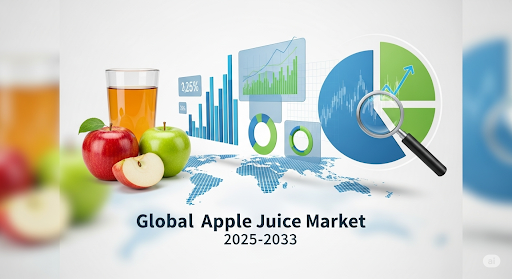
The global apple juice market is witnessing robust growth, propelled by rising consumer demand for healthy and natural beverages. Increasing health consciousness, coupled with the expanding adoption of organic and preservative-free juices, is fueling market expansion. Technological advancements in juice extraction and packaging are enhancing product quality and shelf life. The market is projected to grow steadily, driven by innovations and a shift towards nutritious drink options worldwide.
Study Assumption Years:
- Base Year: 2024
- Historical Year: 2019-2024
- Forecast Year: 2025-2033
Apple Juice Market Key Takeaways:
- The global apple juice market was valued at approximately USD 18.7 billion in 2024 and is forecast to reach USD 28.6 billion by 2033, growing at a CAGR of around 4.46%.
- The ready-to-drink segment dominates due to convenience and rising demand for on-the-go beverages.
- The organic apple juice segment is expanding rapidly, reflecting increased consumer preference for natural and chemical-free products.
- Europe holds a significant market share, led by high consumption in countries like Germany and France.
- Asia Pacific is emerging as a high-growth region, driven by rising disposable incomes and increasing health awareness.
- Cold-pressed apple juice is gaining traction for its superior taste and nutritional benefits.
- Increasing investments in advanced packaging technologies are improving product shelf life and safety.
Market Growth Factors:
- Rising Health Awareness Boosts Apple Juice Demand
Consumers are increasingly focused on health and wellness, driving the demand for natural beverages like apple juice. As people seek healthier alternatives to carbonated drinks, apple juice’s nutritional benefits – such as antioxidants, vitamins, and hydration – make it a preferred choice. The growing awareness of immune health, especially after the pandemic, has also increased consumption. Fitness enthusiasts and families are turning to fruit-based beverages as a daily habit. Moreover, clean-label and organic juice options are attracting conscious buyers. This shift toward healthy lifestyles supports consistent market growth, especially in urban areas where disposable incomes and health education levels are high.
- Expansion of Organic and Natural Juice Segments
The increasing preference for organic products is fueling the apple juice market. Consumers today prefer juices free from pesticides, artificial flavors, or preservatives, aligning with clean-label and natural product trends. Organic apple juice is perceived as safer, more nutritious, and environmentally friendly, appealing to eco-conscious consumers. Food and beverage companies are investing in certified organic farming and production facilities to meet this growing demand. Governments in many countries are also promoting organic farming through subsidies, which supports supply growth. As awareness of the harmful effects of synthetic chemicals rises, the organic apple juice category continues to grow rapidly across supermarkets, online platforms, and health-focused stores.
- Increasing Demand for Ready-to-Drink Beverages
The fast-paced modern lifestyle has increased the demand for convenient, ready-to-drink beverages. Apple juice fits this trend perfectly – offering natural refreshment without the need for preparation. Whether consumed during breakfast, at work, or after exercise, apple juice provides instant energy and nutrition. Manufacturers are launching portable, single-serving bottles to cater to on-the-go consumers. Additionally, innovative blends – like apple mixed with other fruit flavors – are appealing to young customers. This demand is particularly strong in cities where working professionals prefer quick, healthy drink options. As convenience remains a top purchase factor, ready-to-drink apple juice continues to see significant market growth.
Request for a sample copy of this report:
https://www.imarcgroup.com/apple-juice-market/requestsample
Market Segmentation:
- By Product Type:
- Cloudy Apple Juice: Contains natural pulp, offering a richer texture and taste.
- Clear Apple Juice: Filtered to remove pulp, providing a transparent and smooth appearance.
- By Packaging Type:
- PET Bottles: Lightweight and shatterproof, ideal for on-the-go consumption.
- Glass Bottles: Premium packaging offering better preservation and taste retention.
- Cartons: Convenient and eco-friendly packaging widely used in retail.
- Pouches: Flexible packaging offering portability and reduced material use.
- By Distribution Channel:
- Supermarkets/Hypermarkets: Major sales channels offering wide product variety.
- Convenience Stores: Focus on quick purchases and smaller pack sizes.
- Online Retailers: Growing rapidly due to digital shopping trends and home delivery.
- Foodservice Outlets: Includes cafes, restaurants, and hotels serving fresh apple juice.
- Breakup by Region:
North America (United States, Canada)
Asia Pacific (China, Japan, India, South Korea, Australia, Indonesia, Others)
Europe (Germany, France, United Kingdom, Italy, Spain, Russia, Others)
Latin America (Brazil, Mexico, Others)
Middle East and Africa
Regional Insights:
Europe currently leads the apple juice market, driven by established consumption patterns in countries like Germany and France. The region benefits from strong consumer preference for organic and premium juices, alongside advanced manufacturing and packaging technologies. Increasing health awareness and availability of diverse apple juice products continue to fuel demand, positioning Europe as a pivotal growth hub.
Recent Developments & News:
The apple juice market is witnessing innovations such as the introduction of cold-pressed juices that retain more nutrients and offer fresher taste profiles. Key players are focusing on eco-friendly packaging to address sustainability concerns. Additionally, collaborations between juice manufacturers and organic fruit growers are increasing to meet consumer demand for purity and quality. Enhanced digital marketing strategies and e-commerce penetration are also driving new customer acquisition and expanding market reach.
Key Players:
Apple & Eve LLC (Lassonde Industries Inc.), Dabur Ltd, Eden Foods Inc., Manzana Products Co. Ltd., Mott’s (Dr Pepper Snapple Group), Musselman Premium, Parle Agro Private Limited, PepsiCo Inc., Martinelli & Company, The Coca-Cola Company, The Kraft Heinz Company, Tree Top Inc., White House Company, etc.
Ask Analyst for Customization:
https://www.imarcgroup.com/request?type=report&id=6326&flag=C
If you require any specific information that is not covered currently within the scope of the report, we will provide the same as a part of the customization.
About Us:
IMARC Group is a global management consulting firm that helps the world’s most ambitious changemakers to create a lasting impact. The company provides a comprehensive suite of market entry and expansion services. IMARC offerings include a thorough market assessment, feasibility studies, company incorporation assistance, factory setup support, regulatory approvals and licensing navigation, branding, marketing and sales strategies, competitive landscape, and benchmarking analyses, pricing and cost research, and procurement research.
Contact Us:
IMARC Group
134 N 4th St. Brooklyn, NY 11249, USA
Email: sales@imarcgroup.com
Tel No:(D) +91 120 433 0800
United States: (+1-201971-6302)

